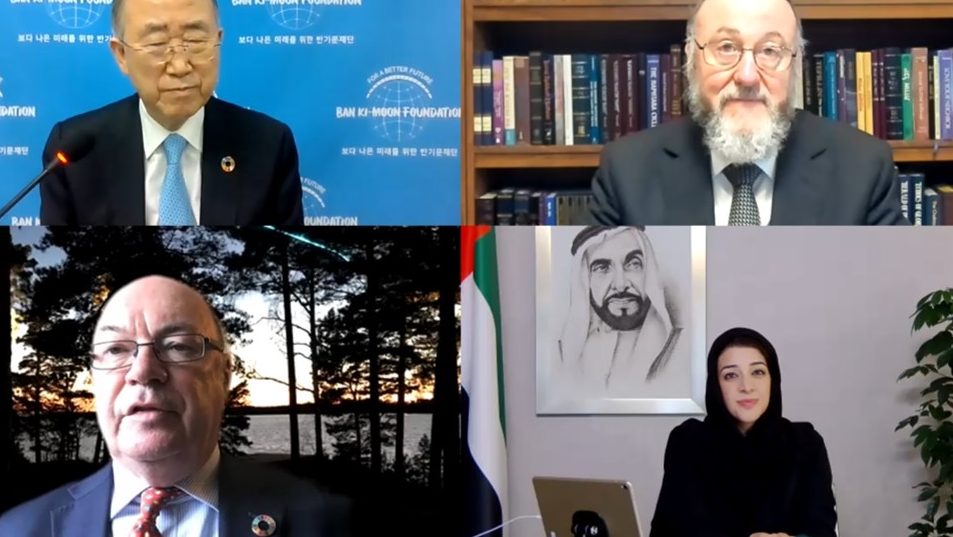‘Emirates Society’ Explores Abraham Accords’ Advancement of UAE-Israel, Middle Eastern, Muslim-Jewish Cooperation
Wide agreement that dialogue, fight against extremism can help shape region for generations to come
The United Arab Emirates has reconfirmed its commitment to a two-state solution to the Israeli-Palestinian conflict that will fight extremism and build a prosperous future for the region’s youth.
This was made clear at a high-level virtual conference on Thursday organized by the Emirates Society, a London-based institution focused on strengthening ties between the UAE and the United Kingdom in the economic, political and cultural spheres.
Her Excellency, Reem bint Ebrahim Al Hashimy, UAE minister of state for international cooperation, emphasized to participants how the country’s belief in dialogue and fighting extremism will help shape the region for generations to come.
“We are committed to a two-state solution in the Middle East that will fight extremism and that believes in plurality, multiculturalism, the rights of minorities and the opportunities that exist for young people by embracing technology, innovation and economic empowerment,” Al Hashimy told The Media Line.
We are committed to a two-state solution in the Middle East that will fight extremism and that believes in plurality, multiculturalism, the rights of minorities and the opportunities that exist for young people by embracing technology, innovation and economic empowerment
She added that the UAE feels “the Middle East struggles with so many challenges, and the youth here deserve to explore what a better future could look like.”
Joined by former UN secretary-general Ban Ki-moon and British Chief Rabbi Ephraim Mirvis, the event attracted over 100 leading figures from government, the civil service, the diplomatic corps, international think tanks, academic institutions and media organizations in the UAE, UK and across Europe and the Middle East.
The discussion focused on the historic Abraham Accords, which normalized relations between Israel and both the UAE and Bahrain, and explored the advancement of UAE-Israel, regional and Muslim-Jewish cooperation.
In his remarks, Ban focused on the importance of religious tolerance and how lessons from the Abraham Accords can be applied to other longstanding issues.
The accords offer a “cooperative space not only for leaders, but also for citizens of all the participating countries,” he told The Media Line.
“The architects of this important agreement must ensure that the accords are not an agreement just for their countries, but for their people,” he added. “The Abraham Accords should serve as a launch pad for the sustainable peace and prosperity in the region.”
The architects of this important agreement must ensure that the accords are not an agreement just for their countries, but for their people. The Abraham Accords should serve as a launch pad for the sustainable peace and prosperity in the region
Mirvis shared an essential perspective on the importance of advancing Jewish-Muslim relations as part of a broader interfaith effort to secure peace in the Middle East and beyond. He noted how the accords had unlocked a range of exciting opportunities, especially when it comes to reconciliation.
“I am hopeful that the accords will also herald a new era of Muslim-Jewish interfaith dialogue,” he told The Media Line. “This is a time for faith leaders to be courageous and work together to build a culture of peace and cooperation in our communities.”
I am hopeful that the accords will also herald a new era of Muslim-Jewish interfaith dialogue. This is a time for faith leaders to be courageous and work together to build a culture of peace and cooperation in our communities
His hopes for reconciliation and dialogue have long been supported by Rabbi Yehuda Sarna, of the Jewish Council of the Emirates.
“I am optimistic that, in the long run, this accord will help bring dignity and safety to Palestinians. In the 21st century, being a neighbor has new meanings. …We are globally connected, and being a physical neighbor carries its own special responsibilities,” Sarna said.
Nevertheless, the Middle East continues to face many security and social challenges as some countries pull in different directions. In recent years, it also has been difficult at times to identify those that have taken an active leadership role on international issues and extremism, apart from Israel.
“This agreement positions the UAE as a leader… and it is our hope that the Palestinians, too, realize the changes and seize the opportunity to come back to the negotiating table,” Eliav Benjamin, head of coordination in the director general’s office at Israel’s Foreign Ministry, told The Media Line.
This agreement positions the UAE as a leader… and it is our hope that the Palestinians, too, realize the changes and seize the opportunity to come back to the negotiating table
The chair of the event was Alistair Burt, a former UK minister of state for the Middle East and chair of the Emirates Society, who reaffirmed the country’s support for the Abraham Accords as a bold diplomatic move to suggest a different future for the Middle East beyond the conflicts that have afflicted it for so long.
Building on the positive impact the accords have had on the Gulf, Al Hashimy told The Media Line that the event was an exciting step in furthering discussions on how diplomacy and goodwill are central to a peaceful Middle East, and showcased what is possible not only for the region, but for the rest of the world.

